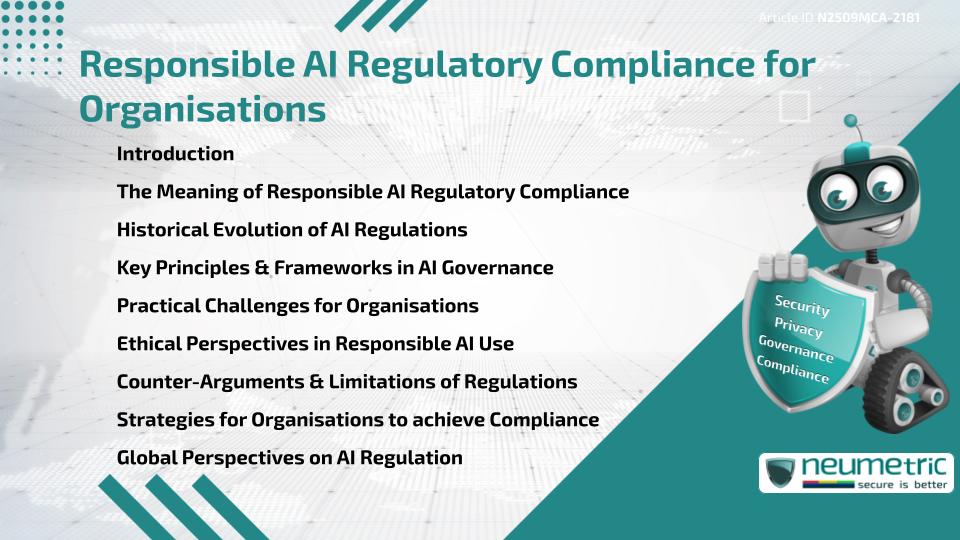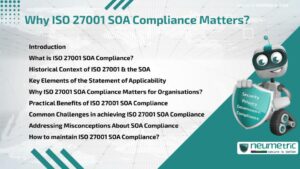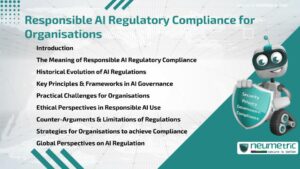Table of Contents
ToggleIntroduction
Responsible AI Regulatory Compliance for organisations is becoming one of the most important areas in business Governance today. As Artificial Intelligence [AI] expands into Healthcare, Finance, retail & public services, the need for accountability, transparency & fairness has never been stronger. Organisations must not only comply with laws but also demonstrate ethical responsibility when designing & deploying AI Systems. This involves adhering to regulations such as the European Union AI Act, understanding Risk classifications, ensuring Data Protection & aligning with global Best Practices. At its core, responsible AI Regulatory Compliance ensures that AI Systems operate safely, avoid bias & respect human rights while enabling innovation.
The Meaning of Responsible AI Regulatory Compliance
Responsible AI Regulatory Compliance refers to the structured alignment of AI Development & deployment with both legal requirements & ethical principles. It is not limited to checking off regulatory boxes but also involves creating frameworks that safeguard users & communities. Just like food companies must follow health & safety standards, AI-driven organisations must comply with rules that govern algorithmic fairness, transparency & data usage.
Historical Evolution of AI Regulations
The conversation around AI Regulation began decades ago with debates on automation, Privacy & workplace safety. Over time, as AI tools became more integrated into decision-making, governments recognised the Risks of discrimination & misuse. For example, early discussions on Data Protection led to laws such as the General Data Protection Regulation [GDPR] in the European Union. More recently, countries like Canada & Singapore have published AI-specific guidelines, showing a shift from general technology Regulation to AI-focused compliance.
Key Principles & Frameworks in AI Governance
Several guiding principles support responsible AI Regulatory Compliance. These include:
- Transparency: Organisations must explain how AI Models make decisions.
- Accountability: Clear responsibility must be assigned for errors or harms caused by AI.
- Fairness: AI Systems must be designed to reduce discrimination & bias.
- Safety: AI tools should be tested for Risks before public use.
Frameworks such as the OECD AI Principles & the European Union AI Act provide organisations with practical guidance. These frameworks are similar to roadmaps, helping organisations navigate the complex regulatory environment.
Practical Challenges for Organisations
Implementing responsible AI Regulatory Compliance can be difficult. Many organisations lack the technical expertise to evaluate algorithmic bias or interpret complex regulations. Smaller businesses may find compliance costly, while larger corporations must manage AI Governance across multiple jurisdictions. Another challenge lies in balancing innovation with compliance. Strict rules may slow development, but weak oversight can expose companies to reputational & legal Risks.
Ethical Perspectives in Responsible AI Use
From an ethical standpoint, responsible AI Regulatory Compliance is about protecting human dignity. AI can influence hiring decisions, credit approvals or medical diagnoses, which directly affect people’s lives. Ethical use requires organisations to think beyond compliance & consider fairness, inclusivity & social impact. For instance, even if an AI tool meets all regulatory requirements, it may still be ethically questionable if it reinforces harmful stereotypes.
Counter-Arguments & Limitations of Regulations
Some critics argue that regulations may stifle innovation & create barriers for smaller firms. Others point out that laws often lag behind technological progress, leaving grey areas that organisations must interpret themselves. Furthermore, global variations in AI Regulation mean that a system compliant in one region may be non-compliant elsewhere. These limitations highlight the need for flexibility in compliance strategies.
Strategies for Organisations to achieve Compliance
To manage responsible AI Regulatory Compliance effectively, organisations can adopt several strategies:
- Conduct regular Risk Assessments for AI Systems.
- Establish internal AI ethics boards.
- Train Employees on responsible AI use.
- Collaborate with regulators & industry groups.
- Maintain clear documentation for audits & transparency.
By following these steps, organisations not only ensure compliance but also build trust with customers & Stakeholders.
Global Perspectives on AI Regulation
Different regions approach AI Regulation differently. The European Union enforces a Risk-based model under the AI Act, while the United States emphasises sector-specific guidance. In Asia, countries like Singapore promote voluntary frameworks that encourage innovation alongside responsibility. For global organisations, responsible AI Regulatory Compliance requires monitoring & adapting to these diverse systems.
Takeaways
- Responsible AI Regulatory Compliance balances law, ethics & innovation.
- Historical lessons show how regulations have evolved alongside technology.
- Frameworks such as the OECD AI Principles provide practical guidance.
- Compliance challenges include cost, expertise & global differences.
- Ethical responsibility should go beyond minimum compliance.
FAQ
What is responsible AI Regulatory Compliance?
It is the process of aligning AI Systems with legal standards & ethical guidelines to ensure safe, fair & transparent use.
Why is responsible AI Regulatory Compliance important for organisations?
It protects organisations from legal Risks, builds public trust & ensures AI applications do not cause harm or discrimination.
What are the main principles behind responsible AI Regulatory Compliance?
Transparency, accountability, fairness & safety are the core guiding principles.
How do global regulations differ in responsible AI Regulatory Compliance?
The European Union focuses on Risk-based rules, the United States relies on sectoral guidance & Asia often promotes voluntary frameworks.
What challenges do organisations face in responsible AI Regulatory Compliance?
Common challenges include technical complexity, high costs & the need to comply with varying global regulations.
Can regulations slow down AI innovation?
Yes, strict regulations can delay development, but they also prevent harmful or unsafe deployments of AI Systems.
How can smaller organisations achieve responsible AI Regulatory Compliance?
They can start with Risk Assessments, use open-source compliance tools & seek external advice when needed.
Is ethical responsibility the same as Regulatory Compliance?
No, Regulatory Compliance sets minimum legal standards, while ethical responsibility encourages organisations to consider broader social impacts.
Need help for Security, Privacy, Governance & VAPT?
Neumetric provides organisations the necessary help to achieve their Cybersecurity, Compliance, Governance, Privacy, Certifications & Pentesting needs.
Organisations & Businesses, specifically those which provide SaaS & AI Solutions in the Fintech, BFSI & other regulated sectors, usually need a Cybersecurity Partner for meeting & maintaining the ongoing Security & Privacy needs & requirements of their Enterprise Clients & Privacy conscious Customers.
SOC 2, ISO 27001, ISO 42001, NIST, HIPAA, HECVAT, EU GDPR are some of the Frameworks that are served by Fusion – a SaaS, multimodular, multitenant, centralised, automated, Cybersecurity & Compliance Management system.
Neumetric also provides Expert Services for technical security which covers VAPT for Web Applications, APIs, iOS & Android Mobile Apps, Security Testing for AWS & other Cloud Environments & Cloud Infrastructure & other similar scopes.
Reach out to us by Email or filling out the Contact Form…





